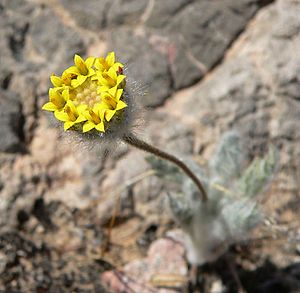Yellowdome facts for kids
Quick facts for kids Yellowdome |
|
|---|---|
 |
|
| Conservation status | |
| Scientific classification | |
| Kingdom: | |
| (unranked): | |
| (unranked): | |
| (unranked): | |
| Order: | |
| Family: | |
| Genus: |
Trichoptilium
|
| Species: |
T. incisum
|
| Binomial name | |
| Trichoptilium incisum |
|
Trichoptilium incisum is a special kind of plant. It's the only species in its group, called Trichoptilium. People often call it yellowdome or yellowhead because of its bright yellow flowers.
This plant belongs to the daisy family. Think of sunflowers or dandelions – they are also in this family! Trichoptilium incisum grows naturally in the Mojave and Sonoran Deserts. These deserts are found in the United States and Mexico.
Contents
What Does Yellowdome Look Like?
Yellowdome plants grow stems from a group of leaves at their base. This group of leaves is called a basal rosette. The leaves have sharp edges, almost like tiny teeth. They are also covered in curly hairs and have special oil glands.
Its Unique Flowers
At the top of each stem, you'll find a small, round, bright yellow flower head. These aren't single flowers, but a cluster of many tiny flowers. This cluster is called a flower head. It looks like a little button, about one centimeter (less than half an inch) wide.
These flower heads only have disc florets. These are the small, tube-shaped flowers you see in the center of a daisy or sunflower. They don't have the long, petal-like ray florets that grow around the outside.
Seeds and How They Spread
After the flowers bloom, the plant produces fruit. The fruit is covered in bristles. These bristles are part of something called a pappus. The pappus helps the seeds float away in the wind, like tiny parachutes. This is how the plant spreads its seeds to new places.
Where Yellowdome Plants Grow
This interesting plant is native to the desert regions. It thrives in the dry, sunny conditions of the Mojave and Sonoran Deserts. These areas are known for their unique plants and animals that can survive in harsh environments.
See also
 In Spanish: Trichoptilium para niños
In Spanish: Trichoptilium para niños


